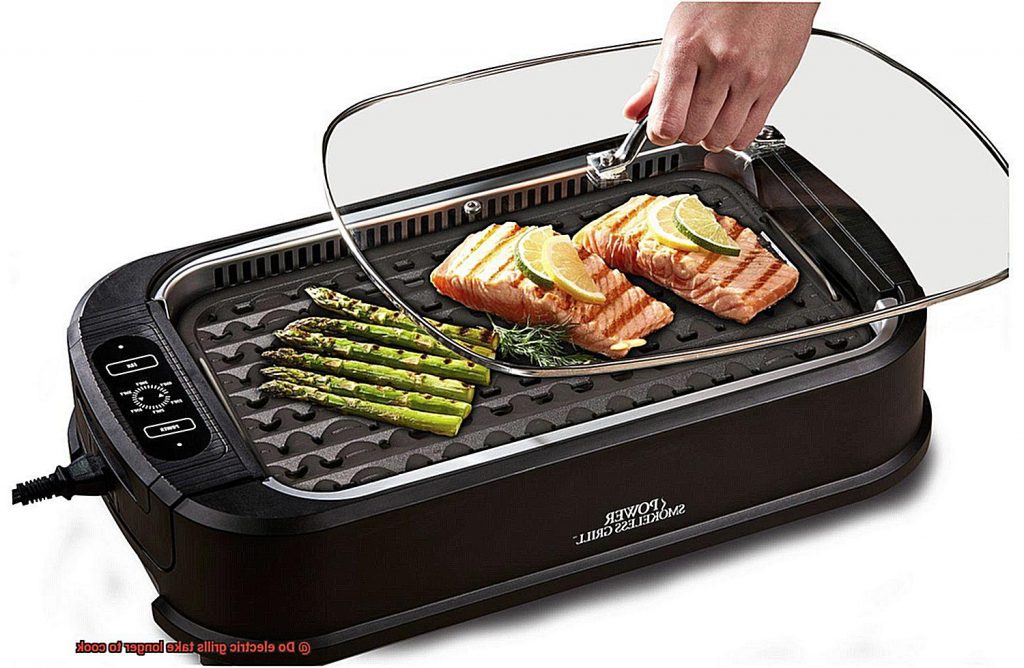Grilling enthusiasts know the joy of sinking their teeth into a perfectly cooked steak or a juicy vegetable skewer. But what if you live in an apartment or don’t have access to an outdoor grill? Fear not, electric grills are here to save the day. However, the question remains: do electric grills take longer to cook than traditional charcoal or gas grills?
Well, it’s not a simple yes or no answer. Electric grills come in different shapes and sizes – open grills, contact grills, and infrared grills – each with its own cooking method and time. The wattage of your electric grill also plays a role in determining cooking time. Generally speaking, electric grills may take slightly longer to cook compared to gas or charcoal ones since they don’t produce the same level of heat.
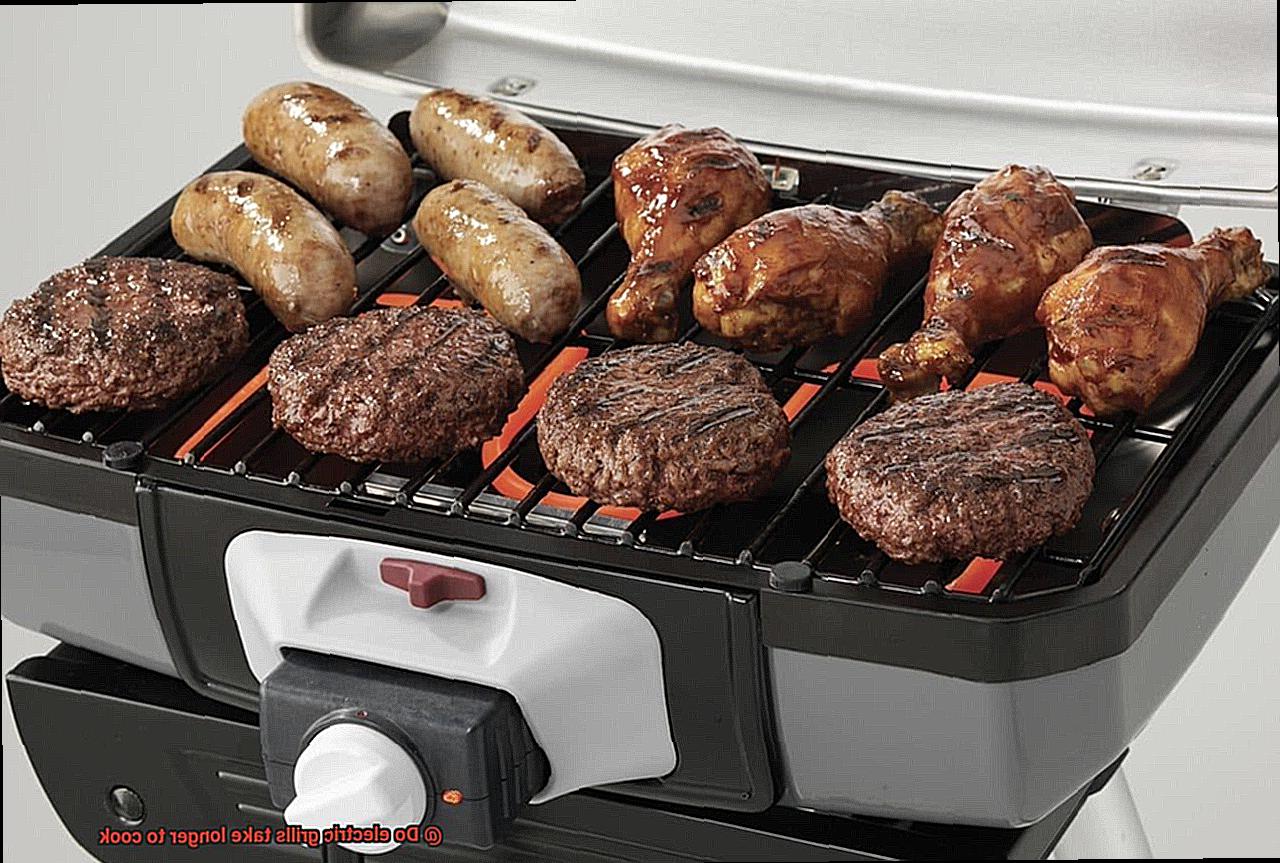
But before you dismiss electric grilling altogether, hear us out. They offer many advantages that make them worth considering. For starters, they’re incredibly user-friendly and require less time to heat up than other types of grills. Plus, they don’t require any propane or charcoal which makes them more environmentally friendly. And let’s not forget that you can use them both indoors and outdoors – perfect for those who live in apartments without access to outdoor spaces.
So next time you’re craving some grilled goodness but can’t use your traditional grill, remember that electric grilling may take a bit longer but has plenty of benefits that make it worthwhile.
Contents
What is an Electric Grill?
An electric grill uses electricity to heat up a non-stick surface, making it perfect for indoor and outdoor use.
Electric grills come in a variety of shapes and sizes, from small tabletop models to larger stand-alone versions that can cook for a crowd. They are quick to heat up and maintain a consistent temperature throughout the cooking process, ensuring that your food is cooked to perfection every time. Plus, they are generally easier to clean than traditional grills since they don’t produce as much smoke or ash.
One of the biggest advantages of electric grills is their convenience. They don’t require any fuel like charcoal or propane tanks, making them easier to set up and maintain. Many models also have removable plates and non-stick surfaces, making cleaning a breeze.
Another common question people have about electric grills is whether they take longer to cook food than traditional grills. While they do typically take slightly longer due to their lower heat output, many models have advanced heating elements and temperature control features that allow them to cook food quickly and evenly.
While electric grills may not provide the same smoky flavor as traditional grills, they are still capable of producing delicious meals in a shorter amount of time. With the right recipes and techniques, you can enjoy perfectly cooked meats, vegetables, and other foods on an electric grill in no time at all.
Some things to consider when talking about electric grills include their versatility, safety features such as automatic shut-off systems, and their ability to be used in places where traditional grills are not allowed due to fire hazards.
Do Electric Grills Take Longer to Cook?
There are several factors to consider when determining the cooking time of an electric grill.
Firstly, the wattage of your electric grill plays a significant role in how quickly it heats up and cooks food. Higher wattage grills can reach higher temperatures faster, allowing them to cook food more quickly. Conversely, lower wattage grills may take longer to heat up and cook food.
Another factor that affects cooking time is the type of food being cooked. For instance, vegetables and fish tend to cook faster on an electric grill compared to meats like steak or chicken. This is because they require less time to reach their desired level of doneness. So, if you’re whipping up a veggie kebab or a succulent salmon fillet, your electric grill will likely do the job quickly and efficiently.
The thickness of the food also affects cooking time. Thicker cuts of meat take longer to cook than thinner cuts, regardless of the type of grill being used. So, if you’re grilling up a thick ribeye steak, it will take longer than a thinner piece of flank steak.
But wait, there’s more. Electric grills offer many advantages over their gas or charcoal counterparts. They’re incredibly convenient and easy to use since they don’t require any fuel or flames to be lit. Plus, they’re perfect for indoor use, making them ideal for apartment dwellers or those who live in areas where outdoor grilling isn’t permitted.
Factors That Affect Cooking Time on an Electric Grill
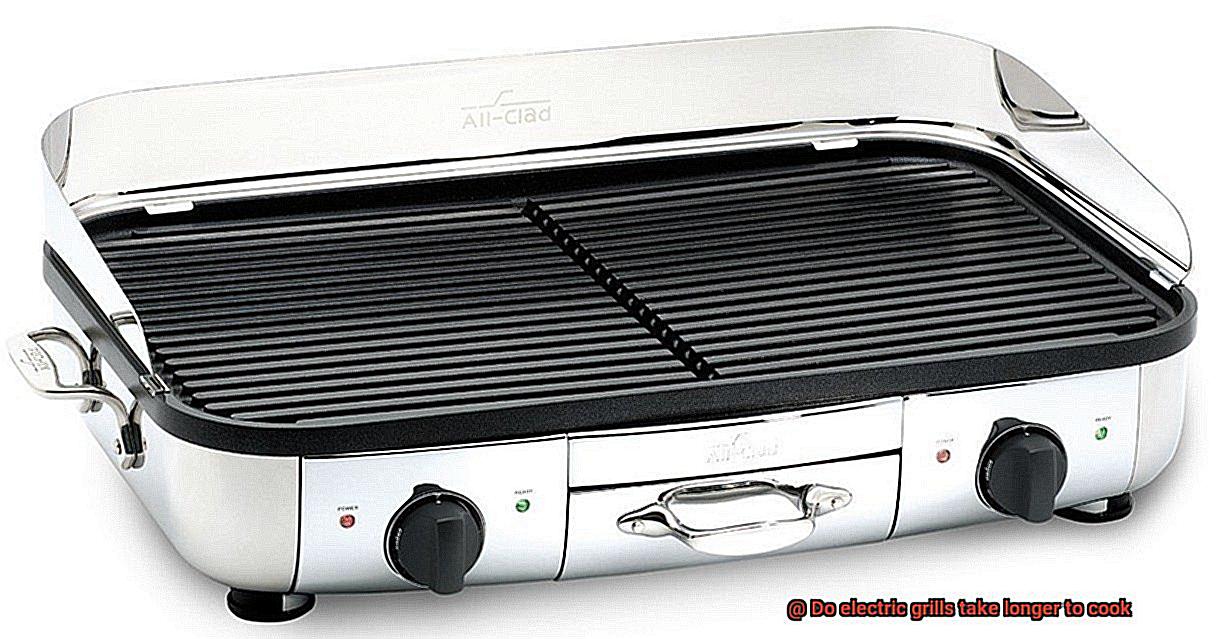
There are several factors that can impact cooking time on an electric grill, each deserving of its attention.
Firstly, the wattage of your electric grill plays a critical role in determining cooking time. The higher the wattage, the faster your grill heats up and cooks food. When in a hurry or want your meals cooked quickly, opt for a higher wattage model. However, keep in mind that higher wattage models come with a higher price tag.
Secondly, the thickness of the food you’re cooking is another factor to consider. Thicker cuts of meat or vegetables take longer to cook than thinner cuts. Therefore, it’s essential to adjust your cooking times accordingly and use a meat thermometer to ensure that your food is cooked to perfection.
The temperature setting of your electric grill is also crucial in determining cooking time. Most electric grills come with adjustable temperature controls, allowing you to choose the appropriate temperature for your food. Higher temperatures generally cook food faster than lower temperatures, but it’s essential to monitor your food closely and adjust as needed.
Another factor that can affect cooking time on an electric grill is weather conditions if using the grill outside. Windy or cold weather conditions can make it harder for the grill to heat up and maintain its temperature, ultimately affecting cooking times.
Lastly, the type of food you’re cooking can determine cooking time on an electric grill. For instance, fish or vegetables may cook more quickly than meat or poultry. Therefore, it’s crucial to take into account the type of food being cooked and adjust cooking times accordingly.
Advantages of Using an Electric Grill
Electric grills provide a convenient option for quick and easy setup. Unlike charcoal grills, you don’t have to wait for coals to heat up or deal with the mess of starter fluid. Simply plug in your electric grill, turn it on, and it’s ready to use.
Consistent temperature control is another advantage of electric grills. This feature is especially important when cooking delicate foods like fish and vegetables. With precise temperature settings, you can ensure that your food cooks evenly every time.
Electric grills also offer smoke-free cooking, unlike charcoal or gas grills. If you live in an apartment or an area where outdoor cooking is prohibited, electric grills are an excellent option. Additionally, they eliminate the need for propane tanks or charcoal bags, making clean-up a breeze. All you have to do is wipe down the grill plates with a damp cloth or sponge, and you’re done.
Versatile cooking options are another benefit of electric grills. They come in various sizes and styles, including both indoor and outdoor models. You can use them for grilling, roasting, baking, smoking, and much more. So whether you want to grill up some burgers for a backyard BBQ or roast a chicken indoors on a rainy day, an electric grill has got you covered.
While some may argue that certain foods take longer to cook on an electric grill compared to gas or charcoal grills, the benefits of using an electric grill far outweigh any minor differences in cooking time. So why not give it a try and see for yourself how convenient and efficient cooking on an electric grill can be?
How to Achieve Perfectly Cooked Food on an Electric Grill
Electric grills are a great alternative to traditional charcoal and gas grills, especially for those who live in apartments or have limited outdoor space. With a little practice and attention to detail, you can achieve perfectly cooked meals on your electric grill every time.
Preheat Your Grill
Preheating your electric grill is essential for even cooking and preventing sticking. Allow your grill to preheat for at least 10-15 minutes before placing any food on it. This will help the grill reach the desired temperature and ensure even cooking.
Control the Temperature
Temperature control is key to achieving perfectly cooked food on an electric grill. Electric grills take longer to heat up and cool down than gas grills, making it important to use a built-in temperature control or a separate thermostat to monitor the temperature. This will help maintain consistent heat and prevent over or undercooking.
Use Proper Cooking Techniques
Using proper cooking techniques will help ensure that your food is cooked evenly and has a delicious outer crust. For thicker cuts of meat, sear them first on high heat before reducing the temperature to continue cooking them. This will help lock in the juices and create a flavorful crust on the outside.
Avoid Overcrowding the Grill
Overcrowding the grill can cause uneven cooking and increase cooking times. Instead, grill in batches or use a larger grill surface if possible. This will ensure that each piece of food has enough space to cook evenly and maintain its flavor.
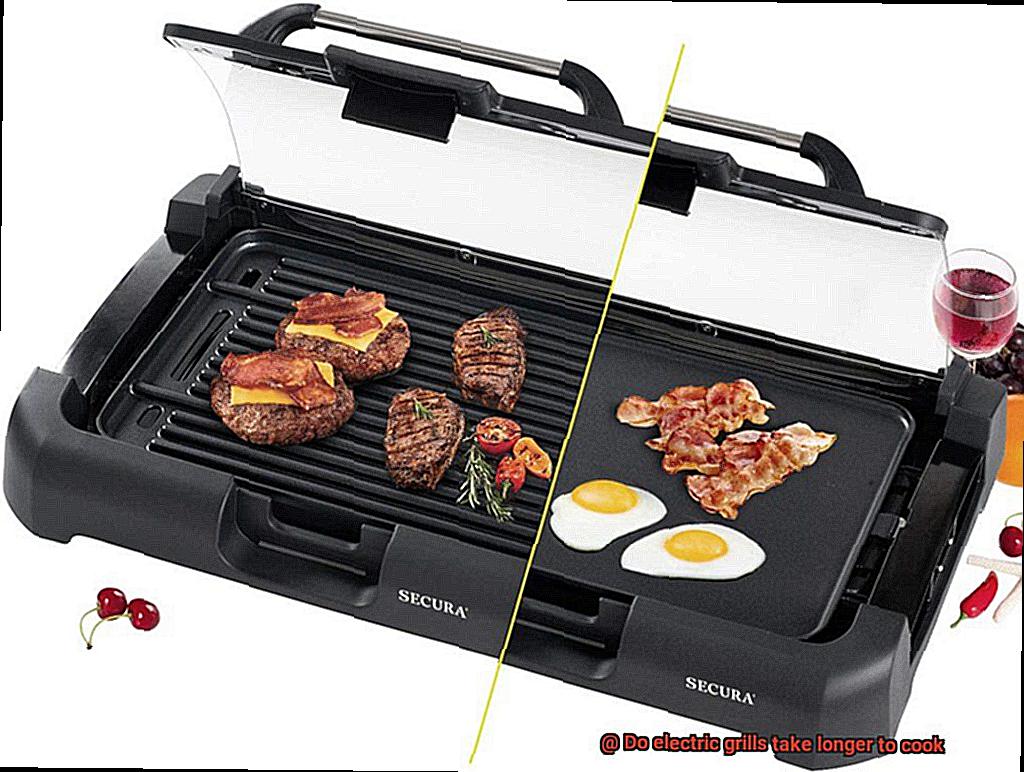
Use a Meat Thermometer
Using a meat thermometer is crucial when grilling meat on an electric grill. It will help you check the internal temperature of the food, ensuring that it has been cooked safely and preventing overcooking. This is especially important when cooking poultry, which needs to reach an internal temperature of 165°F.
Let Your Food Rest
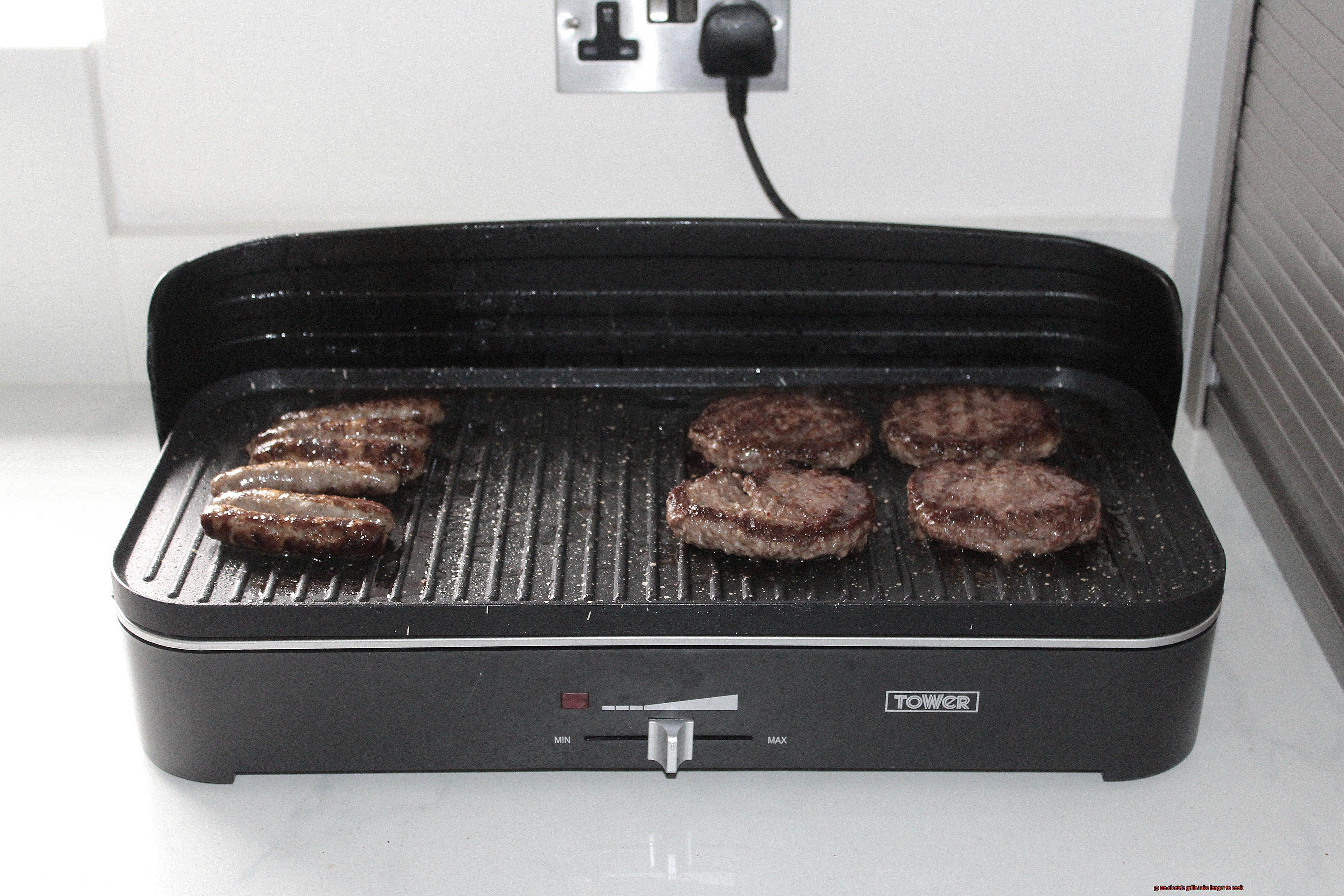
Allowing your food to rest for a few minutes after grilling is important. This allows the juices to redistribute and ensures that your food remains juicy and flavorful. For thicker cuts of meat, allow them to rest for at least 5-10 minutes before cutting into them.
Tips for Using Your Electric Grill
Grilling with an electric grill can be a bit different than using a gas or charcoal grill. With the right tips and tricks, you can get the best results from your electric grill every time.
Preheat Your Grill for Optimal Results
One of the most important things to remember when using an electric grill is to preheat it before you start cooking. Electric grills take a little longer to heat up than other types of grills, so it’s important to turn it on at least 10-15 minutes before you plan to start cooking. This ensures that the grill is at the proper temperature when you add your food, which can help it cook more quickly and evenly.
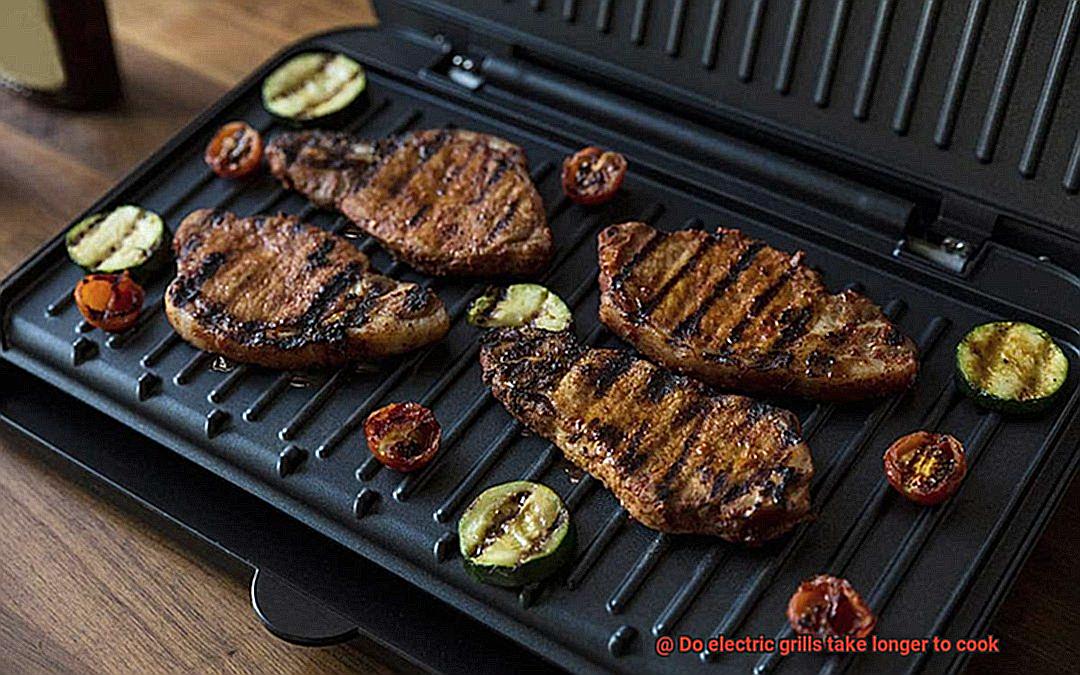
Use Proper Temperature Settings for Different Types of Food
Different types of food require different temperature settings on your electric grill. Thinner cuts of meat may require higher heat settings, while thicker cuts may need lower heat settings to ensure that they cook through without burning on the outside. Always read the manufacturer’s instructions for recommended cooking temperatures and adjust as needed based on your personal preferences.
Avoid Overcrowding the Cooking Surface
Overcrowding the cooking surface can lead to uneven cooking and longer cooking times, as the food may not be able to cook properly with limited space. Consider cooking in batches or using a larger grill surface if possible. This will allow your food to cook evenly and prevent any hot spots on the grill.
Monitor the Temperature While Cooking
Unlike gas grills, electric grills may not have built-in thermometers, so it’s important to use an external thermometer to monitor the temperature of the cooking surface. This is especially important when cooking meats, as undercooked meat can be dangerous to consume. Use a probe thermometer to check that your meat is fully cooked and safe to eat.
Keep Your Grill Clean and Well-Maintained
Keeping your electric grill clean and well-maintained is crucial to its optimal performance. Make sure to clean the cooking surface after each use and check for any signs of wear or damage that may affect its ability to heat up properly. Avoid using abrasive cleaners or tools that could damage the grill’s surface. With proper maintenance, your electric grill will last for many years and deliver delicious meals every time.
Common Mistakes to Avoid When Cooking with an Electric Grill
Many people make common mistakes when cooking with an electric grill, but with some tips from an expert, you can avoid them and become a pro at grilling.
First and foremost, preheating the grill is crucial. It’s tempting to put your food on the grill right away, but giving it enough time to reach the desired temperature (at least 10-15 minutes) ensures that your food will cook evenly. This helps prevent any undercooked or overcooked portions and provides a consistent cooking experience.
Another mistake that many people make is overcrowding the grill. Overcrowding can lead to uneven cooking as there isn’t enough space between the items. This means some items may take longer to cook than others. To avoid overcrowding, leave enough space between each item. Ensure that there’s room for air to circulate around each piece of food so that it cooks evenly.
Using the wrong temperature setting is another common mistake. Different types of food require different heat settings, so it’s essential to follow the manufacturer’s instructions and use the recommended temperature settings. High heat may be suitable for steaks and burgers, but lower temperatures may be necessary for delicate items like fish or vegetables. Make sure you’re aware of the appropriate temperature settings for each food item before placing it on the grill.
Failing to clean the grill properly before every use is another mistake that many people make. A dirty grill can affect the cooking time and cause food to stick, leading to longer cooking times and unevenly cooked dishes. Ensure that you clean your grill thoroughly after every use and remove any leftover food or debris.
Lastly, opening and closing the lid too frequently can impact the overall cooking time on an electric grill. Every time you open the lid, you let out heat, which can extend the cooking time. It’s best to keep the lid closed as much as possible during cooking and only open it when necessary for basting or flipping food.
Also Read: Are Traeger Grills Considered Open Flame?
Conclusion
Electric grills are a game-changer for anyone who loves the taste of grilled food but doesn’t want to deal with the hassle of traditional grilling methods. While they may take slightly longer to cook than gas or charcoal grills, electric grills offer numerous advantages that make them worth considering.
One of the biggest benefits of electric grills is their convenience. They’re perfect for both indoor and outdoor use, making them an ideal option for apartment dwellers or those with limited outdoor space. Additionally, electric grills require less time to heat up than other types of grills, so you can start cooking your favorite meals in no time.
Another advantage of electric grills is that they don’t produce any smoke or ash, making them a cleaner and more environmentally friendly option. Plus, since they don’t require any propane or charcoal, you’ll save money on fuel costs over time.
To get the most out of your electric grill, it’s important to follow proper cooking techniques. This includes factors like wattage, food type, thickness, temperature settings, and weather conditions (if using outdoors). Preheating the grill properly and controlling the temperature are essential steps to achieving perfectly cooked meals on an electric grill. It’s also important to avoid overcrowding the cooking surface and monitor the temperature while cooking with a meat thermometer.
Finally, common mistakes such as not preheating the grill properly or using the wrong temperature setting can impact overall cooking time on an electric grill. To ensure consistent results every time you cook on your electric grill, keep it clean and well-maintained after every use.
In conclusion, while electric grills may take slightly longer to cook than other types of grills, their many advantages make them a worthwhile investment for anyone who loves grilled food.

